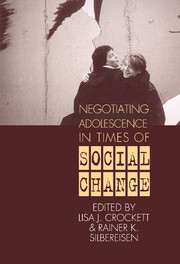Book contents
- Frontmatter
- Contents
- Contributors
- Preface
- 1 Social Change and Adolescent Development: Issues and Challenges
- Part I Models of Social Change Effects
- Part II Social Change and Adolescent Transitions
- Part III Social Change and Adolescents' Social Contexts
- Part IV Implications of Social Change for Adolescent Health and Well-Being
- 13 The Role of Economic Pressure in the Lives of Parents and Their Adolescents: The Family Stress Model
- 14 “Spread Your Wings and Fly”: The Course of Well-Being and Substance Use During the Transition to Young Adulthood
- 15 What Is a Cohort and Why? An Old Question Revisited
- Part V Interventions: Promoting Healthy Development in Times of Social Change
- Endnotes
- Index
15 - What Is a Cohort and Why? An Old Question Revisited
Published online by Cambridge University Press: 26 January 2010
- Frontmatter
- Contents
- Contributors
- Preface
- 1 Social Change and Adolescent Development: Issues and Challenges
- Part I Models of Social Change Effects
- Part II Social Change and Adolescent Transitions
- Part III Social Change and Adolescents' Social Contexts
- Part IV Implications of Social Change for Adolescent Health and Well-Being
- 13 The Role of Economic Pressure in the Lives of Parents and Their Adolescents: The Family Stress Model
- 14 “Spread Your Wings and Fly”: The Course of Well-Being and Substance Use During the Transition to Young Adulthood
- 15 What Is a Cohort and Why? An Old Question Revisited
- Part V Interventions: Promoting Healthy Development in Times of Social Change
- Endnotes
- Index
Summary
In this chapter I will endeavor to discuss the two preceding chapters by Schulenberg, O'Malley, Bachman, and Johnston and by Conger, Rueter, and Conger. This is a task of honor indeed. Both chapters report evidence from studies that are among the most ambitious, well-designed empirical studies of youth in the world. The Monitoring the Future Study (MtF) conducted at the University of Michigan and the Iowa Youth and Families Project conducted at Iowa State University have acquired a paradigmatic standing in the realm of youth studies in the social sciences.
What do these studies have in common beyond their concern with the same or at least a similar life phase, the years 13+ in the chapter by Conger et al. and the years 17+ in the Schulenberg et al. case? Let me try to point to similarities and differences by rereporting the two studies through my personal looking glass.
The study by Schulenberg et al. is descriptive in its focus. Its aim is to document and analyze changes in substance use and well-being during the passage from late adolescence to young adulthood (a) at different historic times and (b) under different forms of living arrangements. Schulenberg et al. address their question by offering impressive nationally representative multicohort panel data of U.S. high school graduates whom they surveyed during the senior year in high school and twice thereafter. This in itself is an accomplishment as yet unmatched.
- Type
- Chapter
- Information
- Negotiating Adolescence in Times of Social Change , pp. 256 - 264Publisher: Cambridge University PressPrint publication year: 1999



